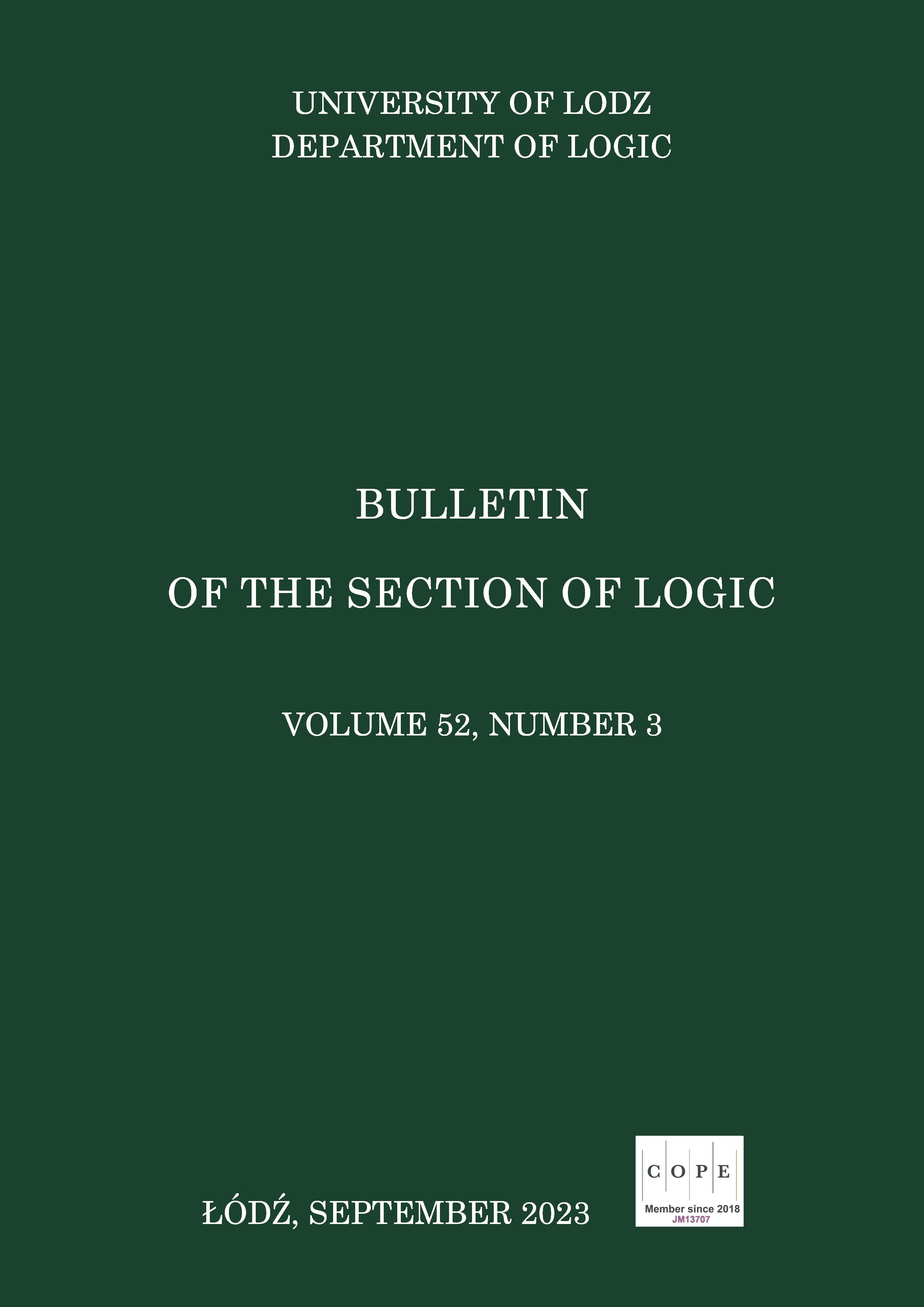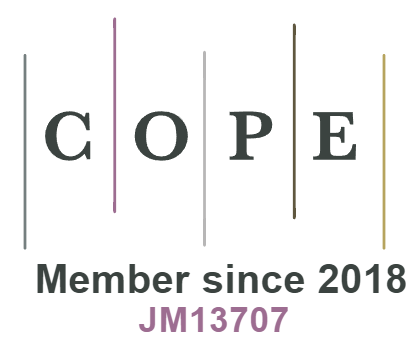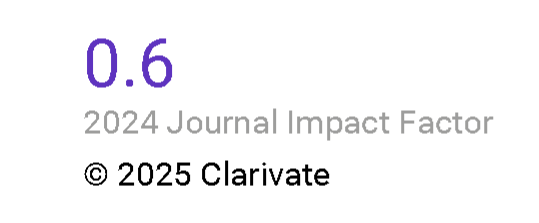Bilateral Rules as Complex Rules
DOI:
https://doi.org/10.18778/0138-0680.2023.13Keywords:
bilateralism, separability, harmonyAbstract
Proof-theoretic semantics is an inferentialist theory of meaning originally developed in a unilateral framework. Its extension to bilateral systems opens both opportunities and problems. The problems are caused especially by Coordination Principles (a kind of rule that is not present in unilateral systems) and mismatches between rules for assertion and rules for rejection. In this paper, a solution is proposed for two major issues: the availability of a reduction procedure for tonk and the existence of harmonious rules for the paradoxical zero-ary connective \(\bullet\). The solution is based on a reinterpretation of bilateral rules as complex rules, that is, rules that introduce or eliminate connectives in a subordinate position. Looking at bilateral rules from this perspective, the problems faced by bilateralism can be seen as special cases of general problems of complex systems, which have been already analyzed in the literature. In the end, a comparison with other proposed solutions underlines the need for further investigation in order to complete the picture of bilateral proof-theoretic semantics.
References
L. Ceragioli, Ex falso and Proof-Theoretic Validity, [in:] L. Bellotti, G. Turbanti (eds.), Fourth Pisa Colloquium in Logic, Language and Epistemology Essays in Honour of Enrico Moriconi, ETS, Pisa (2021).
Google Scholar
L. Ceragioli, Single-Assumption Systems in Proof-Theoretic Semantics, Journal of Philosophical Logic, vol. 51 (2022), pp. 1019–1054, DOI: https://doi.org/10.1007/s10992-022-09658-4
Google Scholar
DOI: https://doi.org/10.1007/s10992-022-09658-4
C. Cozzo, Are Dummett’s requirements on a theory of meaning sufficient for rejecting classical logic?, Erkenntnis, vol. 40 (1994), pp. 243–263, URL: http://www.jstor.org/stable/20012540
Google Scholar
DOI: https://doi.org/10.1007/BF01128595
C. Cozzo, Does epistemological holism lead to meaning holism?, Topoi, vol. 21 (2002), pp. 25–45, DOI: https://doi.org/10.1023/A:1014876214057
Google Scholar
DOI: https://doi.org/10.1023/A:1014876214057
C. Cozzo, On the Copernican Turn in Semantics, Theoria, vol. 74 (2008), pp. 295–317, DOI: https://doi.org/10.1111/j.1755-2567.2008.00026.x
Google Scholar
DOI: https://doi.org/10.1111/j.1755-2567.2008.00026.x
M. Dummett, The Logical Basis of Metaphysics, Harvard University Press, Cambridge (Massachussets) (1991).
Google Scholar
M. Dummett, Elements of Intuitionism, Claredon Press, Oxford (2000).
Google Scholar
R. Dyckhoff, Some Remarks on Proof-Theoretic Semantics, [in:] T. Piecha, P. Schroeder-Heister (eds.), Advances in Proof-Theoretic Semantics, Springer International Publishing, Cham (2016), pp. 79–93, DOI: https://doi.org/10.1007/978-3-319-22686-6_5
Google Scholar
DOI: https://doi.org/10.1007/978-3-319-22686-6_5
F. Ferreira, The co-ordination principles: A problem for bilateralism, Mind, vol. 117 (2008), pp. 1051–1057, DOI: https://doi.org/10.1093/mind/fzn036
Google Scholar
DOI: https://doi.org/10.1093/mind/fzn036
N. Francez, Bilateralism in Proof-Theoretic Semantics, Journal of Philosophical Logic, vol. 43 (2013), pp. 239–259, DOI: https://doi.org/10.1007/s10992-012-9261-3
Google Scholar
DOI: https://doi.org/10.1007/s10992-012-9261-3
N. Francez, Proof-Theoretic Semantics, College Publications, London (2015).
Google Scholar
N. Francez, Bilateralism does provide a proof theoretic treatment of classical logic (for non-technical reasons), Journal of Applied Logic: The ifColog Journal of Logics and Their Applications, vol. 5(8) (2018), pp. 1653–1662.
Google Scholar
M. Gabbay, Bilateralism does not provide a proof theoretic treatment of classical logic (for technical reasons), Journal of Applied Logic, vol. 25 (2017), pp. S108–S122, DOI: https://doi.org/10.1016/j.jal.2017.11.001
Google Scholar
DOI: https://doi.org/10.1016/j.jal.2017.11.001
O. Hjortland, S. Standefer, Inferentialism, structure and conservativeness, [in:] O. Beran, V. Kolman, L. Koreň (eds.), From Rules to Meanings: New Essays on Inferentialism, Routledge, New York, Abingdon (2018), pp. 115–140.
Google Scholar
DOI: https://doi.org/10.4324/9781315103587-6
O. T. Hjortland, Speech Acts, Categoricity, and the Meanings of Logical Connectives, Notre Dame Journal of Formal Logic, vol. 55(4) (2014), pp. 445–467, DOI: https://doi.org/10.1215/00294527-2798700
Google Scholar
DOI: https://doi.org/10.1215/00294527-2798700
B. Jacinto, S. Read, General-Elimination Stability, Studia Logica, vol. 105 (2017), pp. 361–405, DOI: https://doi.org/10.1007/s11225-016-9692-x
Google Scholar
DOI: https://doi.org/10.1007/s11225-016-9692-x
N. Kürbis, Proof-Theoretic Semantics, a Problem with Negation and Prospects for Modality, Journal of Philosophical Logic, vol. 44 (2015), pp. 713–727, URL: http://www.jstor.org/stable/43895412
Google Scholar
DOI: https://doi.org/10.1007/s10992-013-9310-6
N. Kürbis, Some Comments on Ian Rumfitt’s Bilateralism, Journal of Philosophical Logic, vol. 45 (2016), pp. 623–644, DOI: https://doi.org/10.1007/s10992-016-9395-9
Google Scholar
DOI: https://doi.org/10.1007/s10992-016-9395-9
N. Kürbis, Bilateralism: Negations, Implications and some Observations and Problems about Hypotheses, [in:] T. Piecha, J. Fichot (eds.), Beyond Logic. Proceedings of the Conference held in Cerisy-la-Salle, 22–27 May 2017, Tübingen, Germany (2017), DOI: https://doi.org/10.15496/publikation-18676
Google Scholar
N. Kürbis, Normalisation for Bilateral Classical Logic with some Philosophical Remarks, Journal of Applied Logics, vol. 2 (2021), pp. 531–556.
Google Scholar
P. Milne, Classical Harmony: Rules of Inference and the Meaning of the Logical Constants, Synthese, vol. 100 (1994), pp. 49–94, DOI: https://doi.org/10.1007/BF01063921
Google Scholar
DOI: https://doi.org/10.1007/BF01063921
P. Milne, Harmony, purity, simplicity and a “seemingly magical fact”, Monist, vol. 85 (2002), pp. 498–534, DOI: https://doi.org/10.5840/monist200285427
Google Scholar
DOI: https://doi.org/10.5840/monist200285427
P. Milne, Inversion principles and introduction rules, [in:] H. Wansing (ed.), Dag Prawitz on Proofs and Meaning, chap. 8, vol. 7 of Outstanding Contributions to Logic, Springer, Cham, Heidelberg, New York, Dordrecht, London (2015), pp. 189–224.
Google Scholar
DOI: https://doi.org/10.1007/978-3-319-11041-7_8
E. Moriconi, L. Tesconi, On Inversion Principles, History and Philosophy of Logic, vol. 29(2) (2008), pp. 103–113, DOI: https://doi.org/10.1080/01445340701830334
Google Scholar
DOI: https://doi.org/10.1080/01445340701830334
J. Murzi, Classical Harmony and Separability, Erkenntnis, vol. 85(2) (2020), pp. 391–415, DOI: https://doi.org/10.1007/s10670-018-0032-6
Google Scholar
DOI: https://doi.org/10.1007/s10670-018-0032-6
Piecha, Completeness in Proof-Theoretic Semantics, [in:] T. Piecha, P. Schroeder-Heister (eds.), Advances in Proof-Theoretic Semantics, vol. 43 of Trends in Logic, Springer, Cham (2016), pp. 231–251.
Google Scholar
DOI: https://doi.org/10.1007/978-3-319-22686-6_15
D. Prawitz, Natural Deduction: A Proof-Theoretic Study, Almqvist & Wiksell, Stockholm (1965).
Google Scholar
D. Prawitz, Ideas and results in proof theory, [in:] J. Fenstad (ed.), Proceedings of the 2. Scandinavian Logic Symposium, North-Holland (1971), pp. 237–309.
Google Scholar
DOI: https://doi.org/10.1016/S0049-237X(08)70849-8
D. Prawitz, Classical versus intuitionistic logic, [in:] B. L. Edward Hermann Haeusler, Wagner de Campos Sanz (ed.), Why is this a Proof?: Festschrift for Luiz Carlos Pereira, College Publications (2015), pp. 15–32.
Google Scholar
A. Prior, The runabout inference ticket, Analysis, vol. 21(2) (1960), pp. 38–39, DOI: https://doi.org/10.1093/analys/21.2.38
Google Scholar
DOI: https://doi.org/10.1093/analys/21.2.38
S. Read, Relevant Logic, Basil Blackwell, Oxford, New York (1988).
Google Scholar
S. Read, Harmony and Autonomy in Classical Logic, Journal of Philosophical Logic, (29) (2000), pp. 123–154, DOI: https://doi.org/10.1023/A:1004787622057
Google Scholar
DOI: https://doi.org/10.1023/A:1004787622057
S. Read, Proof-Theoretic Validity, [in:] C. Caret, O. Hjortland (eds.), Foundations of Logical Consequence, Oxford UP (2015), pp. 136–158.
Google Scholar
DOI: https://doi.org/10.1093/acprof:oso/9780198715696.003.0005
G. Restall, Multiple Conclusions, [in:] L. V.-V. Petr Hajek, D. Westerstahl (eds.), Logic, Methodology and Philosophy of Science: Proceedings of the Twelfth International Congress, Kings’ College Publications, London (2005), pp. 189–205.
Google Scholar
G. Restall, Assertion and Denial, Commitment and Entitlement, and Incompatibility (and some consequence), [in:] Studies in Logic, vol. 1, Sun Yat-sen University (2008), pp. 26–36.
Google Scholar
I. Rumfitt, “Yes” and “No”, Mind, vol. 109(436) (2000), pp. 781–823, DOI: https://doi.org/10.1093/mind/109.436.781
Google Scholar
DOI: https://doi.org/10.1093/mind/109.436.781
T. Sandqvist, Classical logic without bivalence, Analysis, vol. 69 (2009), pp. 211–217, DOI: https://doi.org/10.1093/analys/anp003
Google Scholar
DOI: https://doi.org/10.1093/analys/anp003
P. Schroeder-Heister, Validity Concepts in Proof-theoretic Semantics, Synthese, vol. 148(3) (2006), pp. 525–571, DOI: https://doi.org/10.1007/s11229-004-6296-1
Google Scholar
DOI: https://doi.org/10.1007/s11229-004-6296-1
F. Steinberger, Harmony and Logical Inferentialism, Ph.D. thesis, University of Cambridge (2008).
Google Scholar
F. Steinberger, Why Conclusions Should Remain Single, Journal of Philosophical Logic, vol. 40(3) (2011), pp. 333–355, DOI: https://doi.org/10.1007/s10992-010-9153-3
Google Scholar
DOI: https://doi.org/10.1007/s10992-010-9153-3
F. Steinberger, J. Murzi, Inferentialism, [in:] Blackwell Companion to Philosophy of Language, Blackwell (2017), pp. 197–224.
Google Scholar
DOI: https://doi.org/10.1002/9781118972090.ch9
N. Tennant, Inferentialism, Logicism, Harmony, and a Counterpoint, [in:] A. Miller (ed.), Essays for Crispin Wright: Logic, Language and Mathematics, Oxford University Press, Oxford, UK (2020), pp. 223–247.
Google Scholar
DOI: https://doi.org/10.1093/oso/9780199278343.003.0009
L. Tranchini, Harmonising harmony, The Review of Symbolic Logic, vol. 8(3) (2015), pp. 411–423, DOI: https://doi.org/10.1017/S1755020315000179
Google Scholar
DOI: https://doi.org/10.1017/S1755020315000179
Downloads
Published
How to Cite
Issue
Section
License

This work is licensed under a Creative Commons Attribution-NonCommercial-NoDerivatives 4.0 International License.















